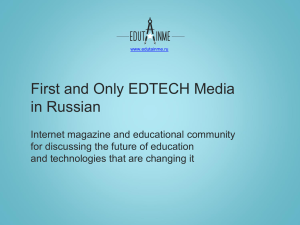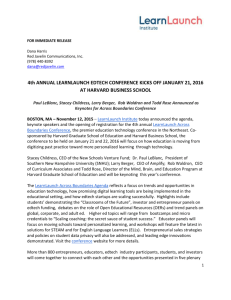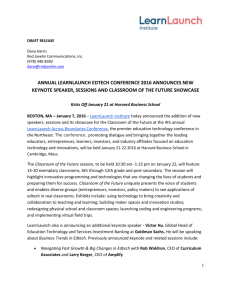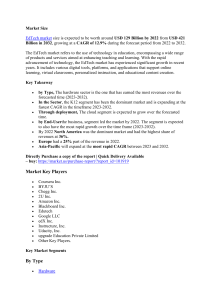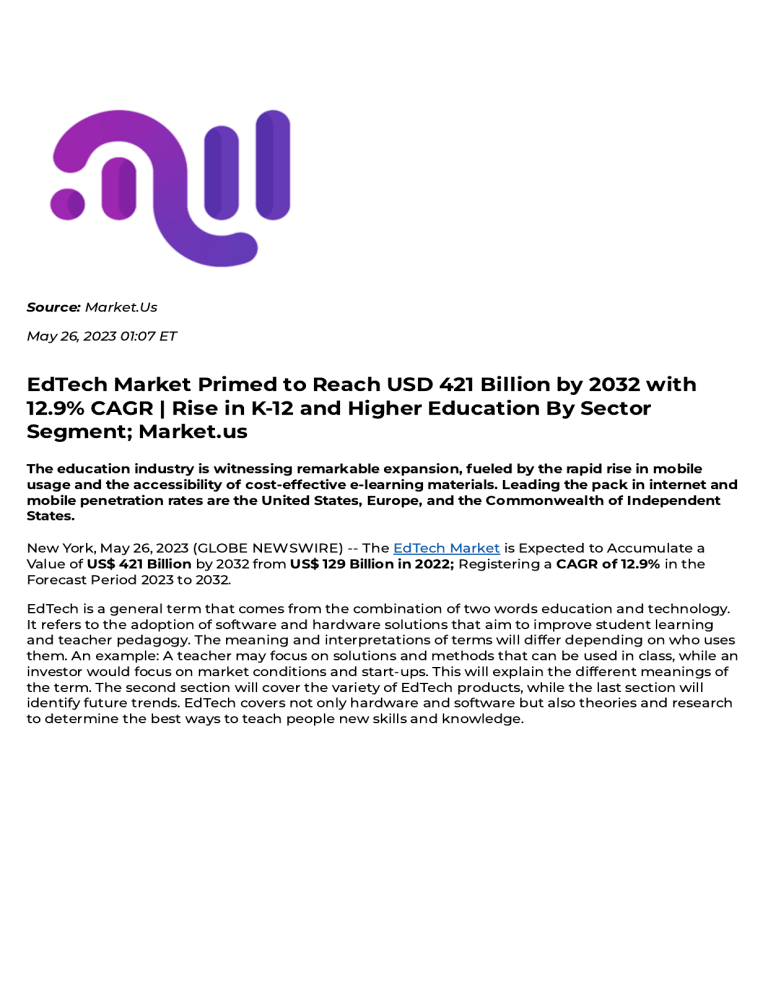
Source: Market.Us May 26, 2023 01:07 ET EdTech Market Primed to Reach USD 421 Billion by 2032 with 12.9% CAGR | Rise in K-12 and Higher Education By Sector Segment; Market.us The education industry is witnessing remarkable expansion, fueled by the rapid rise in mobile usage and the accessibility of cost-effective e-learning materials. Leading the pack in internet and mobile penetration rates are the United States, Europe, and the Commonwealth of Independent States. New York, May 26, 2023 (GLOBE NEWSWIRE) -- The EdTech Market is Expected to Accumulate a Value of US$ 421 Billion by 2032 from US$ 129 Billion in 2022; Registering a CAGR of 12.9% in the Forecast Period 2023 to 2032. EdTech is a general term that comes from the combination of two words education and technology. It refers to the adoption of software and hardware solutions that aim to improve student learning and teacher pedagogy. The meaning and interpretations of terms will differ depending on who uses them. An example: A teacher may focus on solutions and methods that can be used in class, while an investor would focus on market conditions and start-ups. This will explain the different meanings of the term. The second section will cover the variety of EdTech products, while the last section will identify future trends. EdTech covers not only hardware and software but also theories and research to determine the best ways to teach people new skills and knowledge. Get additional highlights on major revenue-generating segments, Request an EdTech Market sample report at https://market.us/report/edtech-market/request-sample/ Key Takeaway: By Type, the hardware segment has generated the highest revenue share during the forecast period (2023-2032). By Sector, the K12 segment has dominated the market, and it is growing at the fastest CAGR over the forecast period 2023 to 2032. By Deployment, the cloud segment anticipated growth during the forecast period. By End-User, the business segment dominated the market in 2022 and is also anticipated to have the fastest growth during the forecast period (2023-2032). In 2022, North America dominated the market with the highest revenue share of 36%. Europe held a 25% revenue share in 2022. Asia-Paci c will grow at the fastest CAGR from 2023-2032. The EdTech industry is expected to grow due to the adoption of digital learning tools such as audience response systems and interactive whiteboards that create a learning environment for students. Digital spending will surpass 5% of total education expenditure in the next ve years. This is due to the favorable government initiatives in all countries to provide grants and funds to students to create smart learning systems. Therefore, it is expected to drive the EdTech market growth during the forecast period. Factors Affecting the Growth of the Global EdTech Market There are several factors that can affect the growth of the global EdTech market. Some of these factors include: Distance Learning Was One Of The Most Popular Trends In The Smart Classroom And EdTech Industry The pandemic has drastically altered the information-learning and teaching process. Social distancing norms have led to learners shifting to digital learning via digital platforms. The trend of distance learning will continue to grow by considering the opening of some educational institutions. The majorly online educational providing platforms are in high demand. Distance learning can be done via a slide-format online method or an online course that helps viewers learn the skills they need. The rapid acceptance of mobile technology has led to signi cant changes in education technology and the market for smart classrooms. The rapid increase in mobile penetration and low-cost e-learning materials is driving the growth of the education sector. The highest internet and mobile penetration rates are found in the United States, Europe, and the Commonwealth of Independent States. In addition, emerging markets are expected to see signi cant growth, as mobile is a vital tool for knowledge acquisition. As a result, the Education Technology Market will proliferate over the next year. EdTech aims to improve student outcomes. Increase individualized education, reduce teaching burden, and lower the cost of instruction. Several individuals praise technology in the classroom. Others fear it can be impersonal and lead to data collection and student and instructor tracking. To understand how our report can bring a difference to your business strategy, Inquire about a brochure at https://market.us/report/edtech-market/#inquiry/ Top Trends in Global EdTech Market The development of arti cial intelligence in education and the teaching of STEM and programming are emerging trends. Immersive technologies in teaching and learning are also a growing trend. Online tuition and language learning are likely to continue to grow in popularity thanks to the Covid-19 pandemic. As schools have to communicate more effectively with parents and offer home learning in the event of school closings, parent portals will be more integrated into daily practice. EdTech products that use adaptive learning algorithms and neural networks are more likely to succeed than traditional learning software, as they offer greater possibilities for personalized learning and parent feedback. As technology becomes more affordable and accessible, virtual and augmented realities will continue to grow and develop. Asia will likely continue to grow as a market because of its large educated population. This creates an apparent demand for EdTech innovation. Regional Analysis The EdTech demand is high in North America, Eastern Europe, Western Europe, Latin America and Asia Paci c, the Middle East & Africa. North America was the dominant revenue share in 2022, with more than 36%. This is due to venture capitalists' large number of investments in the EdTech sector in America. Asia Paci c is expected to see the greatest CAGR during the forecast period. China led regional EdTech market growth, followed by India & Japan. Regional market growth is expected to be driven by favorable government initiatives and increased venture funding from private investment rms. Industry growth is expected to be affected by the increased consolidation of EdTech companies in Asia Paci c. Have Queries? Speak to an expert or Click Here To Download/Request a Sample Scope of the Report Report Attributes Market Value (2022) Market Size in 2032 CAGR (2023 to 2032) North America Revenue Share Europe Revenue Share Historic Period Base Year Forecast Year Details USD 129 Billion USD 421 Billion 12.9% 36.0% 25.0% 2016 to 2022 2022 2023 to 2032 Market Drivers Education technology has several bene ts. According to educators, students learn at different speeds and in different ways. Some students learn best by reading information, but others nd audio-visual information more helpful. EdTech allows students to learn from the most valuable and effective sources. Online learning students enjoy the advantage of accessing training and teaching at their own pace. Online learning allows students to study at their own pace and in a way that suits them best. This makes obtaining education and professional training for all kinds of people easier. This is especially helpful for people who have a full-time job and would nd it dif cult to take regular university courses. The enormous potential savings in education is an obvious and signi cant bene t of EdTech. Online e-learning is available at a fraction of the cost of attending a large university or small community college. Online learning is more affordable than traditional education, making obtaining a degree or professional certi cation easier. Market Restraints Cyberattacks have made schools more vulnerable as they increased the use of technology to teach, learn, and continue school operations in remote environments. Microsoft Security Intelligence reported that the education sector was responsible for 61% of the nearly 7.7 million enterprise malware incidents in the past month. This makes it the most vulnerable industry. These cyberattacks require enterprises to create a robust system to protect Education Technology, Gami cation, and other platforms for students. Although EdTech has many bene ts, it is not recommended for children under ve. Many sociologists, psychologists, educational theorists, and educators fear that students who learn online will not develop the social skills necessary to interact with others. Teachers warn that parents who use distance learning to teach their children should ensure they have regular contact with them via multiple avenues such as eld trips, sports, and other activities. During the COVID-19 epidemic, almost everyone is experiencing a lack of normal social interactions. Market Opportunities EdTech has been around for longer than most people realize. Computer-aided education is simply a natural result of improved technology. Schools and training centers used existing technology in the mid-twentieth Century, including copy machines and media learning via training lms. In the 1960s, schools began experimenting with computers for teaching spelling and math. Soon after internet connectivity was available, online courses were created. It is estimated that six million students enrolled in U.S.-based courses by 2010. Open University in the United Kingdom and the University of British Columbia in Canada pioneered online education. They allowed students to communicate with each other and teachers directly. EdTech has become more accessible and more ef cient thanks to the development of better video conferencing programs and multimedia sources. EdTech now includes innovations such as EdTech "robots" for students to take notes, blockchain tools for educators to grade student work and tools for educators to grade. Grow your pro t margin with Market.us – Purchase This Premium Report at https://market.us/purchase-report/?report_id=101919 Report Segmentation of the Global EdTech Market Type Insight The EdTech hardware segment is predicted to be the largest in the global EdTech market during the forecast period based on its types. This segment's growth can be attributed to the growing demand for learning management software across educational institutions, government agencies, and enterprises. Learning management systems have seen a signi cant increase in demand over the past few years. They allow end users to create, manage, and maintain lessons, courses, as well as other training materials. This will likely increase the market growth for learning management systems over the forecast period. By Sector Insight Due to the growing popularity of gami cation in this sector, the K-12 market accounted for around 35% of the EdTech market by 2022. This is due to the improvement of math skills among students. This provides a rich experience for students in the classroom and exposes them to lab-based experiments as well as virtual eld trips. Mati c, for example, launched an AI-powered learning platform for math through gami ed experiences in September 2022. By Deployment Insight Cloud-based IT systems have become more valuable due to the increasing emphasis on remote learning and digital lesson plans. The cloud is an opportunity for technological innovation that promotes change for its users. Cloud computing is an information technology paradigm that provides computing services over the Internet using remote servers, database systems, and networking. It also uses software, software, and other digital tools. Cloud computing offers signi cant advantages for higher education, especially for students transitioning from K-12 to university. Cloud technology can be used to engage students and teachers in online classes. The cloud is the most popular technology because of its exibility in storage and usage, strong security measures, and ease of use. Teachers can use the cloud to teach online and share large les in many formats and types at a low cost. Nearly every EdTech company or educational organization prefers the cloud. Gami cation is another trend in education technology. Traditional education is tedious and requires a lot of effort and concentration. Gami cation makes learning more fun. Gami cation lets learners compete against each other or against a timer. They can see their scores on leaderboards in real time and earn rewards for scoring well. Gami cation has made learning more fun and exciting for users today. Many major players have adopted gami cation as an emerging EdTech marketing trend. By End-User Insight The business segment dominated the global EdTech market in 2022 and anticipated the fastest growth during the forecast period (2023-2032). The market share increases due to collaboration with EdTech lms, educational institutes, and content creators which all make the signi cant growth of the digital educational sector For more insights on the historical and Forecast market data from 2016 to 2032 – download a sample report at https://market.us/report/edtech-market/request-sample Market Segmentation By Type Hardware Software Content By Sector Preschool K-12 Higher Education Other Sectors By Deployment Cloud On-Premises By End User Business Consumer Other End-Users By Geography North America The US Canada Mexico Latin America Brazil Colombia Chile Argentina Costa Rica Rest of Latin America Eastern Europe Russia Poland The Czech Republic Greece Rest of Eastern Europe Western Europe Germany France The UK Spain Italy Portugal Ireland Austria Switzerland Benelux Nordic Rest of Western Europe APAC China Japan South Korea India Australia & New Zealand Indonesia Malaysia Philippines Singapore Thailand Vietnam Rest of APAC Middle East & Africa Algeria Egypt Israel Kuwait Nigeria Saudi Arabia South Africa Turkey United Arab Emirates Rest of MEA Competitive Landscape The competitive landscape of the market has also been examined in this report. Some of the major players include Coursera Inc. BYJU'S Chegg, Inc. Blackboard Inc. Edutech Google LLC edX Inc. Instructure, Inc. Udacity, Inc. upGrad Education Private Limited Other Key Players. Recent Development of the Global EdTech Market The leading EdTech companies constantly innovate to develop new EdTech products that meet requirements. They have also adopted strategies such as mergers, acquisitions, and partnerships to increase their global reach. For example, SMART Technologies introduced interactive displays that have advanced features such as integrated microphone arrays, greater stability, and NFC login in 2022. Chegg Inc. launched a center for digital learning in June 2022 to support educators and foster excellence across online, in-person, and hybrid learning modalities. The platform will allow educators to share educational content with millions on Chegg, improving learner outcomes. Market.us Research is leading research rm, has also published the following reports: Ed-Tech and Smart Classroom Market was valued USD 88.82 billion in 2021 and estimated CAGR of 17.8%, over forecast year. Game-Based Learning Market was valued at USD 11.5 billion in 2022 and is expected to reach USD 77.4 billion between 2023 and 2032, this market is estimated to register the highest CAGR of 21.6%. Educational Robots Market was valued at USD 1.2 billion in 2022. This market is estimated to register CAGR of 16%. Metaverse Market Size Was To Reach USD 65.2 Billion In 2022 And Projected To Reach a Revised Size Of USD 2346.2 Billion By 2032 About Us: Market.US (Powered by Prudour Pvt Ltd) specializes in in-depth market research and analysis and has been proving its mettle as a consulting and customized market research company, apart from being a much sought-after syndicated market research report-providing rm. Market.US provides customization to suit any speci c or unique requirement and tailor-makes reports as per request. We go beyond boundaries to take analytics, analysis, study, and outlook to newer heights and broader horizons. Follow Us On LinkedIn Facebook Twitter Our Blog: https://medicalmarketreport.com/ https://chemicalmarketreports.com/ https://techmarketreports.com/ https://foodnbeveragesmarket.com/

